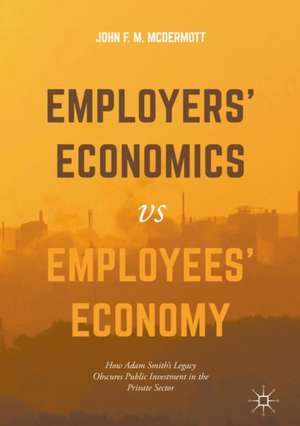Employers’ Economics versus Employees’ Economy: How Adam Smith’s Legacy Obscures Public Investment in the Private Sector
Autor John F. M. McDermotten Limba Engleză Hardback – feb 2017
| Toate formatele și edițiile | Preț | Express |
|---|---|---|
| Paperback (1) | 690.76 lei 43-57 zile | |
| Springer International Publishing – 4 mai 2018 | 690.76 lei 43-57 zile | |
| Hardback (1) | 695.01 lei 43-57 zile | |
| Springer International Publishing – feb 2017 | 695.01 lei 43-57 zile |
Preț: 695.01 lei
Preț vechi: 817.66 lei
-15% Nou
Puncte Express: 1043
Preț estimativ în valută:
132.99€ • 139.22$ • 110.04£
132.99€ • 139.22$ • 110.04£
Carte tipărită la comandă
Livrare economică 07-21 aprilie
Preluare comenzi: 021 569.72.76
Specificații
ISBN-13: 9783319501482
ISBN-10: 3319501488
Pagini: 191
Ilustrații: XI, 191 p.
Dimensiuni: 148 x 210 mm
Greutate: 0.37 kg
Ediția:1st ed. 2017
Editura: Springer International Publishing
Colecția Palgrave Macmillan
Locul publicării:Cham, Switzerland
ISBN-10: 3319501488
Pagini: 191
Ilustrații: XI, 191 p.
Dimensiuni: 148 x 210 mm
Greutate: 0.37 kg
Ediția:1st ed. 2017
Editura: Springer International Publishing
Colecția Palgrave Macmillan
Locul publicării:Cham, Switzerland
Cuprins
Chapter 1: We Invest More Than They!.- Chapter 2: The Paradoxes of Market Economics.- Chapter 3: Economics and Mis-Mathematics.-Chapter 4: Cornucopia, Inc..-Chapter 5: From Employees to Servants.- Chapter 6: A Reformed Economic Science and Economic Reform.
Notă biografică
John F. M. McDermott is Professor Emeritus of the State University of New York. He is the author of four previous books, two of them on economics: Corporate Society (1991) and Economics in Real Time (2004).
Textul de pe ultima copertă
This book argues that economic activity in the public sphere now underwrites private corporations, and rejects rigid adherence to traditional economic theories that no longer apply. Adam Smith's widely used "merchant's model" assumes that most investment is private, when in fact research demonstrates that public investment in the workforce through education and training far outweighs the private sector, and does not account for the growing presence of consensual pricing, the diversification of modern businesses, or the increasing internal authoritarianism of globalizing companies. With de facto public support for these adaptations undermining the universally presumed economic model, private corporations are able to increase their profits while misrepresenting the investment of their own global labor forces. This book suggests an "economy of laws" solution that balances the needed degree of central investment planning with the continuation of our pluralist economy of largely autonomous firms, principally by extending the full rights of citizens into the workplace itself.
Caracteristici
Fuses theoretical and mathematical objections to enforcing Adam Smith's economic models Demonstrates how public investment vastly outweighs private investment in the US Argues that “the private sector” is an ideological construct Describes how contemporary economics pitches employers against employees Proposes that continuing economic learning will lead to expanding economic democracy
